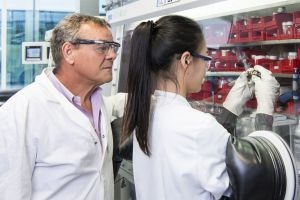Apr 24 2019
The objective for the next-generation sodium-ion batteries is to provide a high-performing, cost-effective, and environmentally friendly alternative to standard lithium-ion batteries (LIBs).
 Professor Stefano Passerini and Hyein Moon assemble a sodium ion battery in a glove box. (Image Credit: Amadeus Bramsiepe, KIT)
Professor Stefano Passerini and Hyein Moon assemble a sodium ion battery in a glove box. (Image Credit: Amadeus Bramsiepe, KIT)
Researchers at the Helmholtz Institute Ulm (HIU) of the Karlsruhe Institute of Technology, the Friedrich-Schiller-University Jena (FSU), and the Center for Solar Energy and Hydrogen Research Baden-Württemberg (ZSW) are presently designing and improving the technically pertinent active materials and electrolytes.
As part of the TRANSITION project, the researchers are creating solutions to make sure that the technology of sodium-ion batteries is transferred to the industrial level, thus making a central contribution to Germany’s more sustainable energy storage market. The German Federal Ministry of Education and Research (BMBF) is funding the TRANSITION project with EUR 1.15 million for a period of three years.
The main aim of the TRANSITION project is to make a major contribution to Germany’s more sustainable energy storage strategy. The markets for stationary energy storage and electromobility will considerably grow in the course of the energy shift and will need more powerful and energy-efficient storage technologies. In terms of energy storage applications, LIBs are currently one of the most prominent successes of the last century. They are compact, light, and provide excellent power and energy density, leading the market for hybrid vehicles, electric vehicles, and portable electronics.
However, in view of the increasingly growing demand of lithium and raw materials employed in the lithium technology, such as cobalt, concerns have been raised about the future and long-term availability of the critical raw material and cost. In this scenario, sodium-ion batteries represent an alternative low cost and more environmentally friendly energy storage technology.
Stefano Passerini, Professor and Director, Helmholtz Institute Ulm.
The objective of the TRANSITION project will be to develop robust polymeric and liquid sodium-ion batteries using biomass-derived hard carbon at the anode side and layered transition metal oxides at the cathode side.
“This is the first German consortium funded by the BMBF to work on the development of up-scaled sodium-ion batteries, covering a broad range of challenges from materials development to prototype cell fabrication,” stated Passerini. As part of the project, Passerini’s team will create novel biomass-derived hard carbon in tandem with aluminum as well as aqueous binders as a current collector.
The development of up-scaled sodium ion battery prototypes and the achievement of the desired goals represent a great challenge we can only meet in a network with the complementary competencies of the partners.
Stefano Passerini, Professor and Director, Helmholtz Institute Ulm.
At the Friedrich-Schiller-University Jena (FSU), the team will handle the research activities for designing sophisticated polymeric and liquid electrolyte solutions, while at the Center for Solar Energy and Hydrogen Research Baden-Württemberg (ZSW), the team will coordinate the development of the cobalt-free cathode.
About the TRANSITION project
All the three partners of the TRANSITION project will collaborate together to develop robust prototypes of liquid and polymeric sodium-ion batteries, thereby supporting Germany’s leadership in the domain of electrochemical energy storage and reinforcing international competitiveness.
In addition to the three scientific partners, the TRANSITION project which is funded under the Batteries 2020 Framework Program of the German Federal Ministry of Education and Research involves an all-inclusive industrial advisory board. The leading scientist Professor Stefano Passerini (HIU), Professor Philipp Adelhelm from the Friedrich-Schiller-University Jena (FSU), and Dr Margret Wohlfahrt-Mehrens from the Center for Solar Energy and Hydrogen Research (ZSW) are part of the scientific groups.